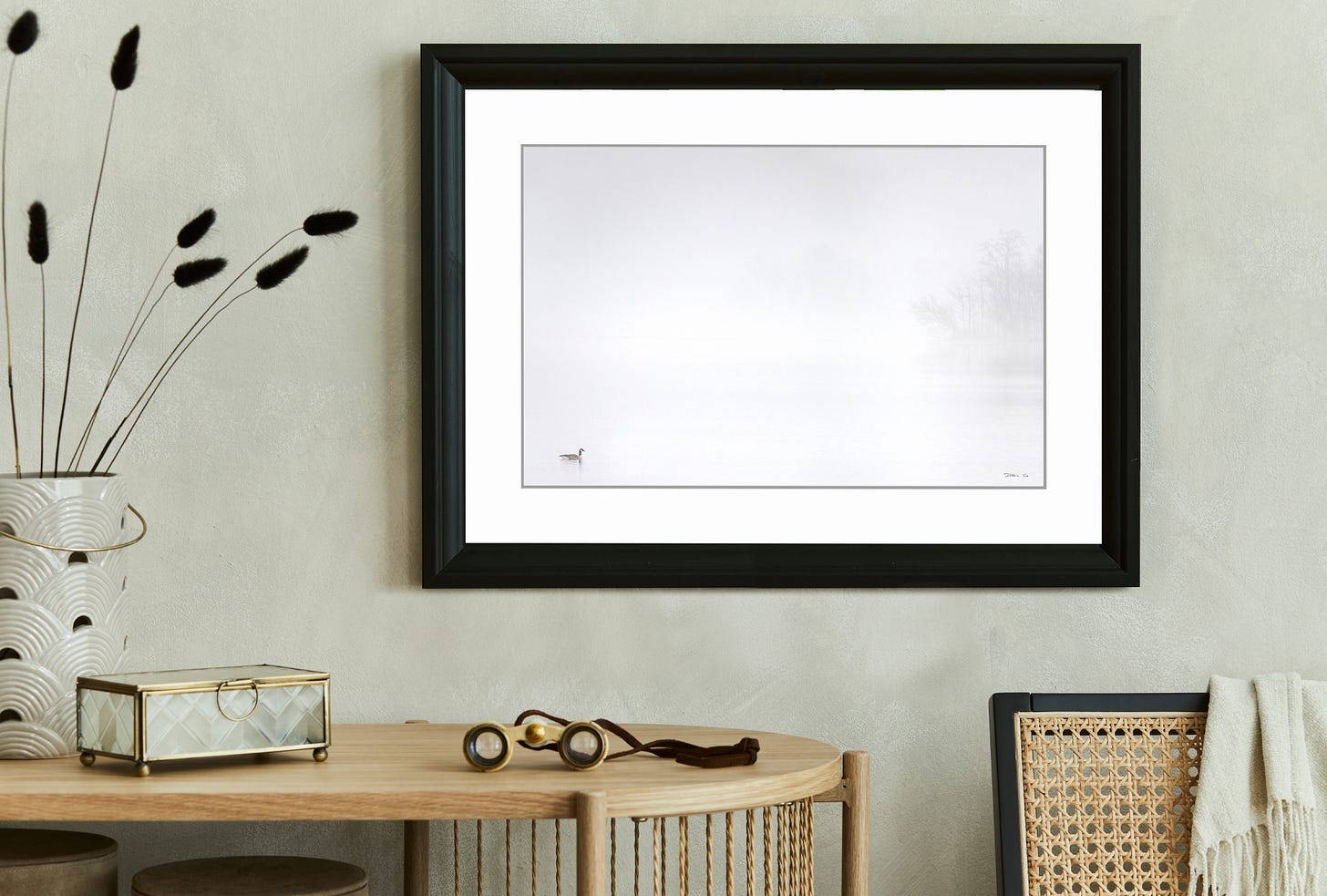This is hard.
People can be critical, and it can feel visceral. Like being cut open with a knife, truly agonizing. We all experience criticism. Unless we’ve hidden ourselves to the point of invisibility.
How do we cope? I’ll start with business, then move to art and life.
Criticism in business
I’ve actually seen many people become invisible (ha!). It happens in large numbers in corporate America. People keeping their heads down, attempting to avoid notice, hiding or pretending to work. It can make you think they don’t care about their jobs, or anyone around them.
But while some people lack initiative and some lack purpose, there are other reasons people devote actual energy towards doing almost nothing. The problem can be fear. Fear of criticism, or of consequences for being seen.
Well-run, competitive organizations attempt to allay such fears, and encourage their people to think and contribute. They have far fewer employees in hiding. Maybe not zero, but far fewer. "Multipliers: How the Best Leaders Make Everyone Smarter" by Liz Wiseman, has nailed it. The book identifies two types of leaders: Multipliers and Diminishers. Some leaders amplify the intelligence and capabilities of their teams, others diminish them.
How a person is critiqued is central to whether they may hide, or not.
Criticism, in its many forms, can impact behaviors in all areas of life. So while Wiseman’s book targets business leadership, I find that business insights and artistic insights often have more in common than you might imagine.
What can we do?
For starters, quite often we can improve our daily experience by carefully selecting our associates. In all facets of life. I try to avoid Diminishers and find Multipliers, and I try to be a Multiplier myself. I highly recommend evaluating all your environments and choosing your workplaces, friend groups, and close personal relationships wisely. Load up on Multipliers. It’ll support you in being healthy, fulfilled, creative, productive, and contributory towards others.
But choosing great associates won’t eliminate criticism. Well-run organizations must still provide feedback to people. Your friends should, your closest partners should. And that feedback won’t always be exactly what you want to hear. If everything you heard was 100% positive, it wouldn’t be helpful anyway. You couldn’t trust it.
I would never want to completely avoid the judgments of others. But I do want to be fully in charge of my response to their judgments.
Criticism in photography
Let’s face it, everybody is a critic. And while the harshest critic might be the person who makes a particular thing, that person will have plenty of critical company when they show their work. If they’re brave enough to do so.
I have a question for you. Whether the arena is business, home, or art, when you receive feedback that seems negative or unsupportive, what’s your first reaction?
When faced with a critique on any topic, we have options.
Option 1
We can evaluate the critique to see if there’s something worthwhile to learn from it. Maybe there is, maybe there isn’t, but we can consider it. We might be able to speak further with the person(s) who provided the feedback. We can take time for self-reflection. And upon reflection, if the critique resonates, it might inform future work or behaviors.
Option 1 is often the ideal response.
If you always behave in an ideal way, please write me with your secret!
Option 2
Or we could dismiss all criticism out of hand and consider none of it. There are advantages and disadvantages to this way of being. I never get tired of the next quote because frankly, it’s cool, and I’m sure it helps reinforce the position of those who choose to ignore 100% of the feedback they receive:
“It is not the critic who counts; not the man who points out how the strong man stumbles, or where the doer of deeds could have done them better. The credit belongs to the man who is actually in the arena, whose face is marred by dust and sweat and blood; who strives valiantly; who errs, who comes short again and again, because there is no effort without error and shortcoming; but who does actually strive to do the deeds; who knows great enthusiasms, the great devotions; who spends himself in a worthy cause; who at the best knows in the end the triumph of high achievement, and who at the worst, if he fails, at least fails while daring greatly, so that his place shall never be with those cold and timid souls who neither know victory nor defeat.”
―Theodore Roosevelt
I like the message to Get Out There and Participate! Yay for that. At the same time, if we dismiss all critiques indiscriminately we’ll miss chances to learn and grow.
People do that. Very successful people are sometimes unwilling to consider the insights of others. They are so good their excrement is odorless. Other people may simply be stubborn in their conviction that they are already doing things in the best possible way, without evidence.
Either way, there are people who firmly believe that nothing could improve the path they’re on, with one exception: If a new, brilliant idea is their own.
Ergo, this letter is not written for them.
Option 3
Finally and sadly, we can get upset, taking the words of our critics personally. Perhaps we lash out in response, perhaps we disappear, saddened and hurt. Wounded. This is the reaction that pains me the most. Particularly when a person subsequently becomes frozen, stagnated. No longer participating.
So many employees in Corporate America hide. They don’t risk being seen, but they also don’t leave. Stuck in place, they just wither. It happens in relationships too, there are large sections in bookstores on the topic.
Aversion to criticism can limit a person wherever it exists, whether it’s in business, relationships or photography.
And many artists avoid showing their work after they’ve been critiqued. Unwilling to experience what they feel is rejection, they’ll present only work they think is “safe” from criticism, if they present anything at all.
There are better ways to cope.
If you can look at things differently, perhaps you can shake it off and get back into Teddy’s arena, if/when you would ordinarily want to retreat.
Help with receiving a critique
I think the secret to handling criticism is itself hiding, nestled among a person’s assumptions and expectations. Let’s talk specifically about photo critiques. They can be a parable for other life topics, and perhaps less confronting. Although art critiques are still quite triggering for many.
Who’s who in perspective
Consider the process of making art, and specifically a photograph, and let’s start with the maker. This fact is true just about 100% of the time: The person who makes an image is the only person in the universe who actually made that thing, in that moment. As such, they have their own, deeply personal experience about making it that nobody else shares. Nobody. Even if there were witnesses. Even if there were two or more photographers side by side.
Furthermore, only the maker has the personal experience of producing the thing that was made. Their ideas preceded the event, and they processed the image after it was captured.1 With all that personal history, the maker will view their work uniquely. In the heart of the maker, a work might have felt trivial to create, or it might have been incredibly, supremely difficult. Or the subject might be unlike other work they’ve made. Various prior experiences impact the way a maker feels about a finished piece.
The viewer has none of the maker’s experiences. None. They don’t. They were not inside the other person’s body for any of the making, so they share none of those perspectives.2 But the viewer absolutely has their own, deeply personal perspectives. And they are very real to the viewer. Like the maker, their life experiences combine to form filters which color everything they see. Before they ever opened your book or saw your image, they carried their own ideas about things that are new to them, and things they enjoy or dislike.
The other person can’t truly know our experience as the maker. Equally, we can’t know theirs as the viewer. And this is NOT a calamity.
In a given time and place, each person has things that matter to them or don’t, and things they like or don’t. Both typically evolve over time, so it’s not even a constant within a given person’s mind.
Examples
If you make and show work you may be very surprised about which pieces are generally popular and which ones are absolutely not. You might feel misunderstood, or get discouraged by the lack of response to your favorites. Take a breath. You got feedback from a select audience of viewers about what they saw and felt. That’s all. It’s always flattering when people like your work, of course, but that doesn’t have broad meaning, either. I’ve had to recognize this for my own work, just like you. For example:

So then how should we interpret feedback?
I believe it depends a lot on the audience, and what you are trying to do.
Non-professional feedback
Lots of people share photographs online or with friends, hoping for feedback, and I think that’s fabulous. Just be ready for whatever comes back, including suggestions that, if you let them, could feel insulting. Some viewers (usually photographers) offer suggested “improvements” telling you to fix this or that, or the result would be improved if only you did XYZ.
If you’ve been the recipient of such, how have you felt? To build on previous paragraphs: Remember they are the viewer, with their own experiences. The viewer who wants to fix or change somebody else's work is often reflecting where they are as an artist themselves. Sometimes that person just loves to hear themselves speak, but often they really are trying to contribute, based on whatever they know at that time.
They don’t hate you when they suggest a change, and they could be providing valuable feedback. They also may make suggestions that seem very wrong. But either way, their feedback is merely their opinion and expression.
If you recognize this, perhaps their critiques will not feel personal.
Clubs
Sometimes people get their work critiqued in photo clubs. In my experience there are many clubs where a sort of group-think can organically emerge. A small number of “good” photographers voice opinions and everybody else follows their lead. Soon the entire group has a consensus idea about what is good or not (this also happens in business and social circles).
The existence of group-think is just something to notice. Don’t hate it, that’s a waste of effort. Just notice it.
Earlier in my career I belonged to a professional photographers’ group that preferred a particular style of work. Nearly all of them did classical portraits and weddings, and they loved soft, flowery scenes, whether portraits or landscapes. If I wanted to get valuable feedback about whether an image was a strong representation of their preferred style, there was no better place to get feedback. Seriously, they are super skilled at their craft, and could help anybody improve in the genre they love. However, they just didn’t have anything to say about most of my work. They were politely dismissive, and in a couple of cases it was actually funny watching a person try to figure out something to say.
It would have been a mistake for me to stop making things in my own style in response to that.
Galleries
Having your work judged by a high-end gallery owner can seem immense, intimidating, and frightening. These are important, skilled, powerful people! But gallery owners are not deities. They are often exceptionally skilled in their space though, whatever it is. It’s right to respect that. Successful curators really understand their clientele, and do a great job of presenting work that their clients will desire.
But none of them represent universal perspectives. The good ones know the niche that they serve, and do it really well.
All galleries serve niches. All of them. Different work appeals to different niches.
If you recognize this, perhaps their critiques will not feel personal either.
Life
Strong parallels exist in social groups. Each group is a niche of its own, within a town or across oceans. A particular behavior might be adored in one group and abhorred in another.
Same with business. In Fortune 500 company, a person who is described as a “Cowboy” may be vilified. That same person could get high praise in a startup. Their gifts may be extremely valuable in the right context.
My best advice is to notice all these things and get out there. Participate as fully as you can, in as many arenas of life as possible. If critiques initially feel like deep, sharp wounds, step back. Consider the source, have some tea, and remind yourself that critiques are not personal affronts. They are feedback from a particular source only. Then when you are ready, refer to Option 1.
Above all, don’t let critics stop you from moving forward. Remember what Teddy said, and please, don’t be invisible. It’s not good for you and it’s robbing the rest of us from receiving your gifts.
Gifts are precious.
Until next time,
Limited Edition Prints for Sale
Another channel of my photography. Oof. But as promised, I’ve got this new set of Limited Edition prints available for purchase. Any unsold African wildlife images from last fall, as promised, have been retired from circulation.
Each edition consists of ten Numbered Prints and two Artists Prints, 16x24” silver halide, with certificate of authentication. As before, these are limited both by number and duration of the offer. If you’d like one or more for that special person, don’t hesitate. You wouldn't want to become he who is lost!
Is there something here you like or dislike? Questions? Have anything else to say? Let us all know by clicking on the Comments button below, and express yourself. Don’t be shy, now.
If you like this post you’re bound to like the next one as well. I’m sending them weekly. Quit any time, or better yet, stay and read on!
Know anybody who should hear about all this? Be a friend and let them know!
Or, are you interested in seeing more work? My website welcomes you. We may even want to work together. I promise a joyous and productive experience if we do.
Visit: www.dobkinphoto.com
Admittedly, there is an exception for posthumously produced work that was begun by the original maker, or work that was otherwise handed over to third party.
As of today, I’m unaware that anybody can do this. I suspect there are numerous science fiction stories that have imagined it in great detail, but that would ruin the point I’m trying to make.












Great topic. In general, I would say criticism is a good thing. I am open for criticism -good or bad- because it helps me to grow and it opens room for discussion. I have received all kinds of feedback regarding my work and I usually thank the people for sharing their opinion. The only thing I have a problem with is when people are disrespectful when sharing their opinion. Even if someone doesn’t like my work, this person can share their opinion with respect.
Great post Donn. I'm a big fan of critique. Always listen to it and then decide what resonates with me. Of course it is very important to know who it is that delivers critique, so you can value it accordingly. Be open, but above all, you are in control!